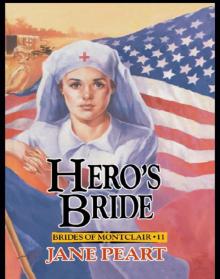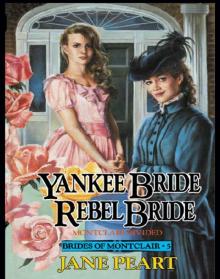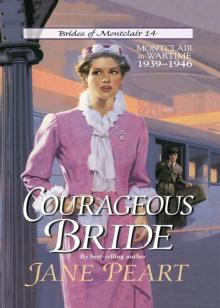- Home
- Jane Peart
Yankee Bride / Rebel Bride Page 15
Yankee Bride / Rebel Bride Read online
Page 15
He leaned down and touched her damp cheek. "Look, Garnet," he said gently, and unfastened the two top buttons of his tunic, opening it to show her the jade stickpin she had given him for Christmas four years before. "My good-luck talisman."
Overcome, Garnet tried to speak, but her throat was too tight. A blazing joy rushed through her at the thought that Malcolm would be keeping that small "part of herself" with him, perhaps carrying it into battle. But her joy was short-lived, for his next words reminded her poignantly of the reality of their situation.
"I must go, Garnet. Comfort Rose if you can. And be kind to her and little Jonathan."
Nearly blinded by tears and speechless with the wounding impact of his words, all Garnet could do was nod. Malcolm clicked to his horse, and Crusader moved forward.
At the gate she saw him turn in his saddle, look back and lift his hat in a salute. Then he cantered through the gates and was gone.
For some reason at just that moment, Garnet glanced up at the house and thought she saw a figure standing at the window of the downstairs master bedroom in the wing Malcolm shared with Rose. With a little pang of guilt, Garnet wondered if Rose had seen her talking with Malcolm and if she minded that Garnet's had been the last farewell.
Garnet shrugged and walked back into the garden. What difference did it make one way or the other? Malcolm belonged to Rose in a way he could never belong to her. All she had of Malcolm were memories of bygone days.
Suddenly she remembered Malcolm's parting words: "Comfort Rose if you can, and be kind to her and little Jonathan."
Garnet gave her head a careless toss as if casting off such tiresome requests. Rose and Jonathan were not her responsibility! And she had no intention of taking them on, in spite of what Malcolm had asked. Besides, there were plenty of servants to care for Jonathan, and Rose seemed content enough with her endless Bible reading and piano playing and walks in the woods. It is not any concern of mine, Garnet assured herself.
"I have enough to do just taking care of myself!"
How strange, thought Rose, observing the encounter with Garnet and Malcolm on the afternoon he left to join his regiment. What terrible irony that Garnet should give Malcolm his last good-bye, instead of me.
Garnet had gloried in the excitement of the last month, as if going off to fight a war were something romantic and heroic. She did not seem to mind when Bryce joined up one day after Virginia declared itself for the Confederacy. In fact, she had accompanied him to Richmond and become caught up in the carnival atmosphere of that city. She had even stayed to help her Cousin Nellie entertain the new soldiers at her gracious home on Franklin Street while Bryce was in training.
But then Garnet was a Southerner, too, and a slave owner as well. Her whole life of leisure and luxury had been fashioned by the institution; she knew no other way of life, would not have understood nor cared about Rose's convictions. Both her brothers were heading up companies of volunteers. It is to all of them a grand and heroic undertaking, Rose thought with a sense of helplessness.
What made Malcolm's going so horrible was that Rose was sure he had no such illusions about war.
After a last parting word to Garnet—what had he said to her?— Malcolm kissed his hand to her, Rose recalled with a sinking heart, and she backed away as he guided his horse forward and began cantering down the drive.
Seeing them together, a sword-sharp pain had plunged into Rose's heart. Then for some reason, almost as if he somehow sensed her watching from window, he had turned in his saddle, touched his hat brim with one gauntleted hand in a farewell wave, then whirled and galloped around the bend, out of sight.
Turning back into the empty room, Rose pressed both hands to her mouth as a convulsive sob escaped. Malcolm was gone!
How could she stay here? How could she go on?
And what of Malcolm? Out there waited the "enemy." He had never known an enemy, nor fought a battle, nor been close to death. Now surely two of them lay ahead of him, and perhaps the other. Once he passed through those gates, his life, everything, would change forever.
chapter
20
BACK IN Richmond, Garnet was again caught up in the social whirl at Cousin Nellie's. There was open house everyday, and her relative's house soon became a mecca for the popular young people now in the city. The house rang with the sound of young voices and laughter and running feet up and down the polished circular staircase.
Garnet circulated freely, making the rounds of parties, balls, theater, and late suppers. She had never been happier. Sometimes, in rare moments of reflection, she would suddenly think how odd that all this was going on while, just a few miles away, men were preparing for war. But these were only fleeting thoughts, for the war was still unreal and Garnet lived for the moment.
Leave was easy to obtain that summer, and Bryce was often at the house on Franklin Street, enjoying seeing Garnet surrounded by admiring fellow officers, realizing that they envied him his vivacious wife. But though he often mentioned the possibility of a quick visit home to Montclair, Garnet always found a reason to put it off.
As it turned out, they did not find time to go home that summer, and then quite suddenly Bryce did not come nor was he heard from for days. Even Garnet sensed a creeping anxiety as rumors of a tremendous battle to be waged at Manassas spread throughout Richmond. She knew Bryce's regiment, attached to General Beauregard, was there.
During the battle special prayer services were held in all the Richmond churches. Because everyone else was going, and because it was expected of the wife of an officer, Garnet went, too. But she was most uncomfortable, feeling herself strangely detached from the kneeling, prayerful women around her.
The deep, melodious voice of the minister called the people to pray with David from the Psalms. There was a rustle all about her as desperate wives and children of the men even now engaged in battle flipped through their Bibles to find the right place. Garnet, who did not own a Bible, sighed impatiently until Cousin Nellie held hers so Garnet could read along with her: "God is our refuge and strength, a very present help in trouble. Therefore we will not fear—"
But suddenly Garnet was seized with fear, real and quivering through her whole body.
The church seemed unbearably close as the service proceeded. Garnet moved, shifting her position, but she was wedged in between Cousin Nellie's voluminous skirt and another lady who, head bowed devoutly, sat stiffly immobile.
With one finger Garnet loosened the ribbons of her bonnet, for she was finding it difficult to breathe easily. Then her bodice seemed too tight, her stays cutting sharply into her waist. Her mouth felt dry, and she could not swallow. When her heart began to flutter, and she felt suddenly faint, she sought out the possible exits, her eyes darting nervously from side to side. If only she had found a seat in the back of the church instead of marching up front to the Perrys' pew! Panic gripped her at the realization that she was trapped here until the end of the interminable service.
She would have stood up, in spite of everything, and rushed out right then, except that the minister began to address the congregation, and she could not go without causing a commotion. She clenched her hands tightly in her lap and tried to listen.
"There is not one here who does not have a son, brother, husband, or friend in the fray—"
The names flashed like fire across her mind: Malcolm! Rod and Stewart! Bryce! Maybe even Leighton! All the men in her life, and those she had met so casually in the last few weeks. All of them were there, in danger—killing, or perhaps, being killed!
Garnet's throat tightened, and she felt as though she were being strangled. How could she sit here another minute and be reminded of all she could lose. Hadn't she lost quite enough already?
Then everyone was standing to sing the finalhymn, "The Lord is my light and my salvation, whom shall I fear?"
The words rang in her ears: "To sing praises unto Thy name and of Thy truth in the night season—"
The night season! Surely this
was the darkest moment she had experienced in her life thus far. What if Malcolm should be killed? Or her brothers, or Bryce?
Now everyone was kneeling again and Garnet slipped to her knees, too. She was trembling. Again the voice of the minister flowed over her—as if he were speaking directly to her.
"For God hath not given us a spirit of fear, but of power and of love and of a sound mind—"
As the words penetrated Garnet's clouded mind, she felt calmer. Slowly her breathing returned to normal, and the panic subsided. Of course, she thought, there is nothing to fear. They'll be all right. How silly of me to be frightened!
She did not realize, because she was unfamiliar with spiritual things, that she had been touched by the Word of God, and something within her had responded to that touch. The assurance came, startling her with its intensity, that Bryce was all right. He was safe!
Without being conscious of its significance, Garnet slipped to her knees and breathed an inner "thank you." Then she took a long breath and rose to join her clear, strong voice to the final hymn, "Now Thank We All Our God."
Two days later came the news of the Confederate victory at Manassas, and the city celebrated.
A victory party was in full swing at Cousin Nellie's house when Bryce appeared, his arm in a sling from a slight flesh wound. He was hailed as a conquering hero; for once, Garnet preened with pride in her husband, content to relinquish center stage and bask in the reflected glow of his glory.
The days after Malcolm left seemed all gray to Rose, although it was still only early summer.
The big house was strangely empty with all the men away. Mr. Montrose had gone to Montgomery, Alabama, where the first convention of the Confederacy was taking place. Leighton and Malcolm were training with their company. Bryce had left for Richmond, and Garnet soon after.
With Lizzie gone, too, Rose soon found her time filled with chores. Since no other maid had been suitably trained to meet her mother-in-law's demands, Rose tried to fill in the gap.
Although she soon discovered Sara was almost impossible to please, Rose was determined to be patient with her. Apparently Lizzie had carried out her mistress's management duties as well. Here Rose stepped in quite satisfactorily. Her Aunt Vanessa's training had prepared her well, and she was anxious to make amends for her part in Lizzie's defection, and to keep Sara's fretting from making her condition worse.
Rose never knew there was so much to running a plantation household. She soon learned, however, that unless she gave specific directions, the well-trained house servants tended to waste time. Besides meeting with the cook each morning to plan the day's menus, Rose found she had to go to the smokehouse, granary, and storage cupboards to measure out the supplies of butter, flour, and meal necessary for the preparation of each day's meals. Montclair did not run by magic as she might have imagined when she first came—so effortlessly and smoothly had things seemed to get done.
Rose's days were long and full of decisions to be made, orders to be given, servants to oversee. Time spent with Jonathan was unalloyed joy, but most of his care had to be turned over to Linny.
Even though they were difficult, Rose could handle the days. It was the long, lonely nights that were hardest to bear. At least during the day her thoughts were diverted. But at night all she could do was think about her broken communion with Malcolm.
She relived those last few days before he left, going over the conversation, word for word, that had severed their relationship. Why had it happened? If their love was as strong and true and real as she had believed it to be, why had this broken the cord that bound them so completely? She longed to recall those words, spoken in anger.
As she tossed and turned half the night, Rose questioned herself relentlessly. Whose fault was it that they had let something so splendid slip away? Malcolm's? Hers?
Night after night, she lay in the big four-poster alone, alternately weeping and pounding her fists into the pillow. At last she came to the sad conclusion that their love had been an illusion. They had been so young, so bedazzled by emotion, that they had mistaken these feelings for the kind of tenacious love that is needed to survive the storm that now had swept them in its path.
Rose's tragedy, she felt, was that she loved a man who no longer existed—or who may have existed only in her imagination. She yearned for the adoring suitor of their romantic courtship; she could not understand the stubborn stranger he had become.
Even his letters were addressed to the entire family, and were read aloud by Mr. Montrose. He ended them with the words, "Love to each of you, special hugs to my little son, and a howdy to the servants." Each word—so cold, so casual, so impersonal—fell on Rose's spirit like a hammer blow. How unlike the young man who had written such impassioned lines to her from Harvard, when he was only a few miles away and would often be seeing her the next day.
Jonathan was Rose's chief consolation. He was merry, handsome, loving—the pet of the whole household. His nurse and the other house servants adored him, and Rose was hard put to keep him from being completely spoiled. She was determined that he would not grow up thinking himself superior to anyone, ordering people about, expecting to be served. Of course, who knew into what kind of a world Jonathan would grow up?
So Rose kept her hurt to herself. She wept in secret and hid her pain, taking a kind of pride in not showing her feelings, flowing with the life of the house and the countryside as it swirled about her, while she wondered how it would be when Malcolm came home.
Rose could not help resenting a little that Garnet, sparkling with gaiety, came and went like a will-o'-the-wisp, bringing with her all the gossip and amusing tales told in the parlors of Richmond. She never stayed long and no one ever knew where she would be, for she rode back and forth between Montclair and Cameron Hall constantly.
Bryce was still in Richmond, deciding which regiment would see the fighting first.
"I declare that man wants to be the first one to kill a Yankee!" Garnet said lightly, tossing her curls without a glance or a thought that her remark might wound Rose.
John Meredith was already in the blue uniform of a Union lieutenant, and Rose asked herself if the situation were reversed, if she would have been more considerate, knowing that Garnet's brothers had already joined the Confederate Army.
Rose's only comfort was that she was not the only person suffering from the sorrow of a divided family, split loyalties. Even Mrs. Lincoln, it was said, had sisters who married Confederate officers and were loyal to the South. The sword of division slicing through the country cut a wide swath; virtually no one was left untouched.
Rose's thoughts often turned with longing to those days of the past filled with small joys, ordinary pleasures, spun out in unrippled serenity. Days when nothing much seemed to happen. Now she wished those days back with a fierce yearning. Did anyone ever imagine that a time would come when the most uneventful day would seem something to treasure?
Rose got out her diary again. She had not written in it since before the fateful day of her disagreement with Malcolm. But now she needed to pour out the feelings that were impossible for her to express elsewhere.
Everything is happening so quickly. The pleasant, quiet days of last summer seem like a dream, for everything here is changing even from day to day.
Garnet, home from Richmond, is bursting with enthusiasm for the Confederate cause. She wears a palmetto cockade a friend from South Carolina gave her, and you would think she was personally advising President Davis, so positive are her opinions on how the war should be conducted.
I should make allowances and not be so easily offended. Garnet is so childish in many ways, so careless in her remarks, yet I can understand. Malcolm explained her to me once: "She has always been so pretty, so amusing, that she is forgiven everything." He is right—Garnet has never grown up. She is still her papa's spoiled little girl. Father Montrose perpetuates the same attitude toward her outrageous behavior, calling her "that little scamp" when she ridicules one of his frien
ds. And Bryce merely shrugs it off. He has no influence over her whatsoever. Yet I wonder what will happen to all that surface gaiety so like spun sugar, in the face of the reality that must someday come into her life?
I shouldn't judge Garnet when I have so many unchristian feelings toward her myself. In a way I envy her lightheartedness, her total confidence that she will always be on the winning side, that everyone will always love her, give in to her, pardon her. It must be reassuring to go through life on such a cloud of universal approbation.
I think I most envy her having known Malcolm since childhood. I wish Malcolm and I could have had all those lovely, leisurely years to remember. Our time together now seems so heartbreakingly brief. I hold onto it like a drowning person grasps at straws, and each day I lose a little of it as though it never really existed at all.
Rose set down her pen, thinking of Garnes last visit. She had run lightly up the staircase, her taffeta skirts swishing on the polished steps, gold-red curls flying, and down the hallway to Sara's suite. Rose had been there, settling Sara for her afternoon nap when they were both startled by Garnes arrival.
With a passing glance at Rose, Garnet had perched on the end of Sara's bed and handed her a box, ornately bowed and wrapped.
"It's from Pinzinni's, Mama—chocolate strawberry creams!" she announced with a little bounce of satisfaction, dimples winking. "Oh, it is the loveliest place in Richmond. Everyone seems to end up there after making calls, and it is like an impromptu party every afternoon." She gave a laugh and pulled off her kid gloves, finger by finger.
Rose watched Sara's languor fade into eager interest as Garnet rattled off story after story of Richmond's social life.
After Garnet had danced off to prepare for a visit to Cameron Hall, Rose recalled with some surprise that throughout the long conversation with her mother-in-law, Garnet had not once mentioned Bryce or his plans.

 Hero's Bride
Hero's Bride Daring Bride
Daring Bride Runaway Heart
Runaway Heart Promise of the Valley
Promise of the Valley Gallant Bride
Gallant Bride The Pledge, Value
The Pledge, Value Senator's Bride
Senator's Bride Valiant Bride
Valiant Bride Shadow Bride
Shadow Bride Destiny's Bride
Destiny's Bride A Tangled Web
A Tangled Web Folly's Bride
Folly's Bride The Promise
The Promise Mirror Bride
Mirror Bride Jubilee Bride
Jubilee Bride Yankee Bride / Rebel Bride
Yankee Bride / Rebel Bride A Montclair Homecoming
A Montclair Homecoming Fortune's Bride
Fortune's Bride Undaunted Spirit
Undaunted Spirit Love Takes Flight
Love Takes Flight The Risk of Loving
The Risk of Loving The Pattern
The Pattern Courageous Bride
Courageous Bride